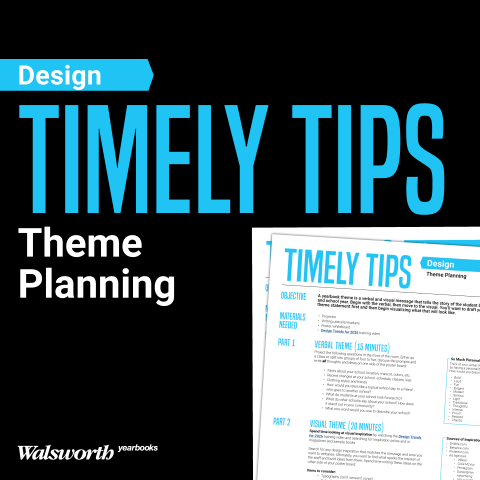National and local critique and rating services provide yearbook advisers and staffs with feedback to guide improvement of their publication as well as earn award recognition.
In the rush of the end of the year, be sure to make time to send your yearbook out for a critique to get feedback on your students’ work. Once the critique is returned in the summer or early fall, the feedback can be a great discussion starter on improving all aspects of your book. Use the critiques to learn what you are doing well and to chart a course for creating an even better yearbook in the year ahead.
Many of the national, regional and state scholastic press associations hold award contests as well where your staff can get local and national recognition for the quality work they have done.
National Critiques and Contests
If you want feedback and recognition on the national level, there are several options available to you and your staff. You be the judge of what will best fit your needs:
Columbia Scholastic Press Association (CSPA)
To participate in the contests at CSPA and get a Medalist Critique, you must first join the organization. Joining at their “Regular” membership level will get you a Medalist Critique, entrance into the Crown competition, 30 free Gold Circle entries for individual student work and access to a Crown awards slide show. The cost is $269 for a print yearbook; $309 for a hybrid yearbook which includes linked video.
Deadlines: Spring publications/media: June 10, 2019; Fall yearbooks: October 1, 2019
From their website: “To help student print or online media improve their final product the Association offers its Medalist Critiques. Each year, student newspapers, magazines, yearbooks or online media are invited to submit issues or hyperlinks to the Association’s experienced adviser-judges.
“The Critique contains a written set of standards developed by the Association to itemize the best practices for student media. The adviser-judge reads the print or online publication and analyzes its strengths and weakness as described by the Critique. The judge writes out comments and makes constructive suggestions for building on current strengths and correcting deficiencies noted in the Critique.”
Parallel to the Medalist Critique service, CSPA also gives Crown Awards. These awards are judged separately by a panel of judges and notification of if you have been selected to receive a Crown Award comes in early November. Final Gold or Silver Crowns are awarded at the CSPA Spring Convention in March.
National Scholastic Press Association (NSPA)
NSPA also offers both critiques and their top national award, the Pacemaker. To be able to get a critique and enter the Pacemaker contest, schools must first join the organization for $129.
From their website: “Evaluate your work in student media with an NSPA critique. NSPA provides a critique service for newspapers, magazines and yearbooks.
“The critique is a written evaluation of work submitted by a publication. Professional journalists, experienced media advisers and other media professionals serve on the NSPA board of judges.
“The judge writes comments and scores your publication in several different categories such as coverage, writing and design. The composite score from all sections gives the publication an honor rating ranging from Third Class to All American. The All American rating is the highest rating given to any publication in the critique service. Media that have achieved 10 All American honor ratings in an 11-year span are inducted into the All-American Hall of Fame.
“The critique service usually takes 10 to 14 weeks. NSPA makes every effort to return the completed critique as soon as possible.
“NSPA members can add on a critique for high school publications for $89. Junior high members can add a critique for $50. Supercritiques are $129.” See website for current deadline.
American Scholastic Press Association
Though not attached to a major university and national press association, the American Scholastic Press Association also offers a critique service.
From their website: “Our service, in the form of a CONTEST, provides advice on page design, story layout, graphics, headlining, cover design, advertising placement, photography and a variety of other useful items. When a school is spending several thousand dollars on a school publication, this service more than pays for itself in the help it provides in the year-to-year improvement in the style, format, contents, and presentability of the school yearbook or magazine.
“Each school yearbook and magazine is scored on a point system and is awarded a FIRST, SECOND, or THIRD PLACE in its classification. Those school publications with special and outstanding design and content may receive a FIRST PLACE WITH SPECIAL MERIT. Other entries for special category award consideration are explained on the entry application.”
The cost for the evaluation is $70 and an extra $11 to have the yearbook returned.
“(The ASPA) tends to be a little more ‘liberal’ with their First, Second and Third Place Awards, in my opinion, which can help bolster the confidence of a staff who’s trying to improve their publication. Then it’s up to the adviser to help ease them in to the more competitive critiquing services. I tend to describe them as a more entry-level stepping stone critiquing service,” Walsworth Yearbooks Representative Michelle DiSimone said.
Though Quill and Scroll does not offer whole book critiques for yearbooks, they do offer a Yearbook Excellence Contest for individual student work.
From their website: “Winners of the Quill and Scroll 2019 Yearbook Excellence Contest will receive a National Award Gold Key and are eligible, as seniors, to apply for one of the Edward J. Nell Memorial or George and Ophelia Gallup scholarships. High school students who are contributors to or staff members of a student yearbook at any public or private high school were invited to enter the competition. Awards will be made in each of the 18 categories. There are two enrollment classes: Class A: more than 750 students; Class B: 749 or fewer.”
For more information, contact Jeff Browne at quill-scroll@uiowa.edu.
How can I know if my staff will get a useful, quality critique?
JEA has developed a training module to help better prepare all publication judges. Several state press associations are recommending that all of their judges participate in the training.
National Critique Training
In the spring of 2019, JEA introduced a staff development module to train judges who are or are planning to critique publications at either national or local levels. This module is open to all advisers and is a great tool for improving our publications.
From the JEA website: “There is perhaps no better education for advisers than to engage in the process of critiquing student publications. Individual advisers improve their own practice through the experience of conducting student media evaluations. Yet organizations offering critiques and contests often have a difficult time developing new talent, ensuring transparency in the process and providing ongoing professional development for current judges.
Under the leadership of Jack Kennedy, MJE, and Mark Newton, MJE, JEA hosted a gathering of scholastic journalism leaders in June 2016 to identify common criteria of excellent critiques and evaluations as well as outline the biggest challenges, inconsistencies and areas of need. In June 2017, a smaller group of JEA leaders met to continue this dialogue and explore options for a way JEA could help train judges and provide more support for both advisers and organizations offering critiques.
To this end, JEA developed a free online course, “Critique training: You be the judge.” The training takes one to two hours to complete and serves as a guide to prepare advisers for the experience of judging student media for contests or critiques. Based on successful completion of the online course, participants earn a JEA Critique Training badge and are credentialed in the system, which includes being listed in JEA’s national judging database.
Developing a deeper pool of excellent judges benefits scholastic journalism broadly while helping local, state, regional and national press associations better support their membership.
In 2018, participating organizations endorsed the following criteria for student media critiques:
Good critiques should:
- Apply consistent and transparent expectations from judge to judge and entry to entry.
- Include concrete, specific and thorough feedback based on recognized best practices.
- Acknowledge and encourage the idea that the best student media programs are labs for experimentation. Students may be doing something that doesn’t adhere to the traditional expectations outlined in the evaluation tool. Judges should be flexible enough to allow for individual choices made by student media outlets in meeting the needs of their specific audience.
- Contain specific recommendations for improvement to student media outlets in ways that improve low-performing outlets but also challenge high-performing outlets by providing next steps for growth of the media outlet.
- Include both positive comments and constructive criticism.
- Recognize that the realities of a student classroom experience differ from that of the professional media in terms of time, budget and resources available.
- Address student freedom of expression and journalism law and ethics, including copyright, plagiarism and censorship issues that are apparent to the judge.
- Address the most basic storytelling skills (reporting and writing, photojournalism, presentation, etc.).
- Address industry-standard technical skills (software usage, media platforms, etc.).
- Address targeted areas identified by an adviser or student leaders in their introductory statement.
- Provide opportunities to demonstrate growth over time (year-to-year or within years).
- Have specific deadlines for submission and be returned in a timely manner to provide useful feedback.
- Be completed by a qualified judge.
I recently took the course and earned my badge and it was definitely worth the time. It helped refresh my own critiquing practice and helped make connections on the objectives of all scholastic publications.
State and Regional Press Associations Offering Contests and Critiques
Below is a list of some of the largest state scholastic journalism organizations that offer state journalism contests and critique services each year.
If you don’t see your state listed below, you should find it here on this more exhaustive list of scholastic state media associations located on the JEA website.
Colorado Scholastic Media Association
CSMA offers a yearbook critique service and individual contests. Time of year for critiques: submission in June, with results back to schools in early August. Check out the CSMA Yearbook guidebook. For more information, contact jpkjournalism@gmail.com.
Georgia Scholastic Press Association
GSPA offers critiques with submission dates in July/August. For more information, contact gspa@uga.edu.
Florida Scholastic Press Association
FHSPA offers both critiques and individual contests. For more information, contact fspaoffice@gmail.com.
ILPC – Interscholastic League Press Conference – Texas
ILPC offers both critiques and individual contests. For more information, contact Jeanne Acton jacton@uiltexas.org
Kettle Moraine Press Association – Wisconsin/Illinois
KEMPA offers critiques in July-October. Check out their critique booklets. For more information, contact tjuran@wi.rr.com.
Michigan Interscholastic Press Association
MIPA offers critiques and contests in February/March, July/August and November/December. For more information, contact mipa@msu.edu.
Missouri Interscholastic Press Association
MIPA offers both critiques and individual contests. Submission dates in summer and fall. For more information, contact mipajourno@gmail.com.
Mississippi Scholastic Press Association
MSPA offers critiques and individual contests. For more information, contact mississippischolastpress@gmail.com.
North Carolina Scholastic Media Association
NCSMA offers critiques and individual contests. For more information, contact ncsma@unc.edu.
Ohio Scholastic Media Association
OSMA offers critiques and individual contests. For more information, contact cbowen@kent.edu.
Southern California Journalism Education Association
SCJEA offers a number of individual contests. Open to all California schools. For more information, contact socaljea@gmail.com.
Southern Interscholastic Press Association – SIPA
SIPA offers critiques and individual contests. For more information, contact dwilson@vhsl.org.
VHSL offers critiques and individual contests. For more information, contact dwilson@vhsl.org.





